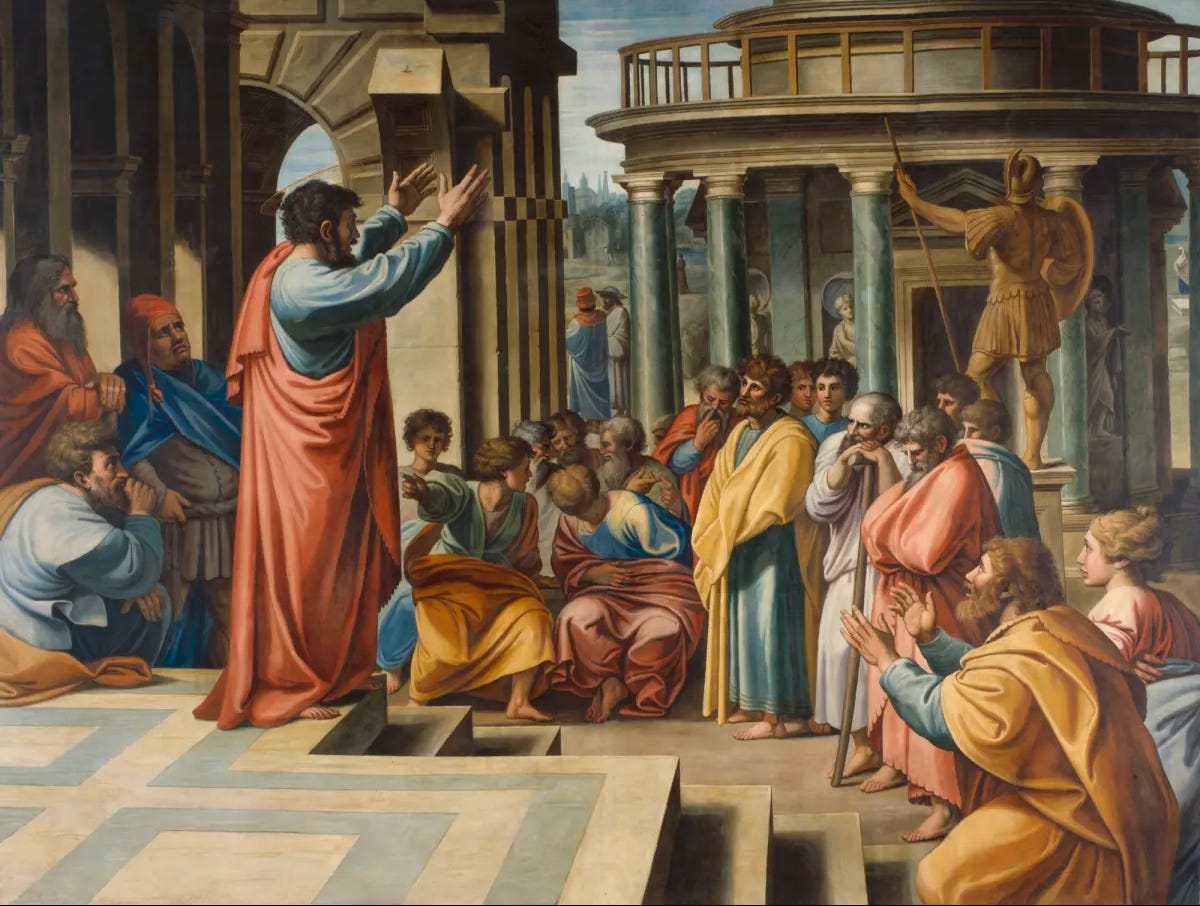Reclaiming the Aeropagus
Why Cultural Apologetics Is the Only Path to Restoring Christian Influence Today
When the Apostle Paul ascended the rocky hill of the Areopagus in ancient Athens, he faced a culture eerily similar to our own: sophisticated, pluralistic, intellectually curious, yet spiritually adrift. Furthermore, Paul understood something that contemporary Christians have largely forgotten: the Gospel requires active cultural engagement, intellectual rigor, and strategic communication within the dominant philosophical frameworks of the day. Instead of retreating into religious enclaves or limiting himself to preaching to the converted, Paul ventured directly into the intellectual heart of pagan culture with transformative results.
Today’s Christians find themselves confronting an even more complex cultural landscape, one that demands the same bold apologetic approach Paul demonstrated two millennia ago. Consequently, the time for passive Christianity has ended, while the urgent need for robust cultural apologetics has become undeniable.
The Post-Christian Collapse: Understanding Our Cultural Moment
Contemporary Western civilization stands at a crossroads that previous generations of believers never imagined facing. Additionally, the Judeo-Christian worldview that once provided the moral and intellectual foundation for entire societies has been systematically dismantled through decades of secular indoctrination. Moreover, the institutions that once safeguarded Christian principles: universities, courts, media, and even many churches themselves: have been captured by ideologies fundamentally opposed to biblical truth.
This cultural shift manifests itself through multiple disturbing trends that demand immediate Christian response. Furthermore, the normalization of moral relativism has created a generation that views absolute truth claims as inherently oppressive. Similarly, the worship of individual autonomy has replaced traditional understandings of divine authority and natural law. Meanwhile, the therapeutic culture has transformed sin into psychological dysfunction while eliminating any meaningful concept of personal responsibility before God.
The sexual revolution represents perhaps the most visible symptom of this deeper philosophical collapse. Additionally, the systematic redefinition of marriage, family, and human sexuality reveals a civilization that has rejected the fundamental anthropological insights of Christianity. Furthermore, the ongoing assault on human life: from abortion to euthanasia: demonstrates how thoroughly Western culture has abandoned its once-sacred understanding of human dignity rooted in the Imago Dei.
These developments reveal something more sinister than mere cultural decay: they represent a coordinated intellectual and spiritual campaign against Christianity itself. Consequently, Christians can no longer afford to treat these challenges as temporary political disagreements or generational misunderstandings. Rather, they represent fundamental worldview conflicts that demand the kind of sophisticated cultural apologetics that Paul employed in Athens.
The Judeo-Christian Response: Natural Law and Magisterial Authority
In this hostile environment, only one intellectual tradition possesses the philosophical depth and moral authority necessary to respond effectively: the synthesis of Judeo-Christian revelation, natural law reasoning, and magisterial Catholic teaching. Furthermore, this three-fold foundation provides the only comprehensive alternative to the nihilistic materialism that currently dominates Western intellectual life.
Natural law philosophy, refined through centuries of Catholic intellectual development, offers rational arguments for objective moral truth that transcend religious authority while remaining fully compatible with biblical revelation. Additionally, this approach enables Christians to engage secular intellectuals on philosophical grounds while maintaining the integrity of revealed truth. Moreover, natural law provides the logical foundation for human rights, constitutional government, and social justice that secular ideologies ultimately cannot sustain.
The magisterial tradition of Catholic teaching adds another crucial dimension to this apologetic approach. Furthermore, the accumulated wisdom of two millennia of theological reflection, philosophical development, and pastoral experience provides resources that individual Protestant denominations or non-denominational movements simply cannot match. Additionally, the continuity and consistency of Catholic doctrine offers a compelling alternative to the fragmentation and theological confusion that characterizes much of contemporary Christianity.
This integration of reason and revelation, philosophy and theology, individual conscience and ecclesiastical authority, represents the kind of comprehensive worldview that modern culture desperately needs. Moreover, it provides the intellectual framework necessary for Christians to engage effectively with the dominant secular institutions of contemporary society. You can explore these themes further in my analysis of natural law Christianity.
From Maintenance Mode to Missionary Engagement
The greatest tragedy of contemporary Christianity may well be its retreat into what can only be described as maintenance mode rather than missionary engagement. Furthermore, too many Christian leaders have accepted the marginalization of their faith as inevitable while focusing exclusively on preserving existing believers rather than winning new converts. Additionally, this defensive posture has allowed secular ideologies to capture the commanding heights of culture without meaningful Christian resistance.
Paul’s example at the Areopagus demonstrates a radically different approach to cultural engagement. Moreover, rather than limiting himself to synagogue preaching or private discipleship, Paul deliberately sought out the intellectual and cultural centers of pagan civilization. Furthermore, he engaged the dominant philosophical schools of his day on their own terms while maintaining absolute fidelity to the Gospel message. Additionally, Paul understood that Christianity would either transform the culture or be marginalized by it: there was no middle ground.
Contemporary Christians must recover this missionary mindset if they hope to restore Christian influence in Western civilization. Furthermore, this requires moving beyond the comfort zones of established Christian communities to engage directly with secular institutions, intellectual movements, and cultural forces that currently oppose biblical truth. Additionally, it demands the kind of intellectual preparation and cultural sophistication that enables effective communication with educated secular audiences.
The stakes of this cultural engagement could hardly be higher. Moreover, every major institution that Christians abandon to secular control becomes another platform for anti-Christian indoctrination. Furthermore, every intellectual battlefield that Christians refuse to contest becomes another stronghold for ideologies fundamentally opposed to human flourishing. Additionally, every cultural conversation that Christians exit becomes another opportunity for secular voices to define reality according to their materialistic assumptions.
The Cost of Disengagement: Losing Ground We Cannot Afford to Lose
The price of continued Christian disengagement from cultural apologetics becomes more apparent with each passing year. Furthermore, the complete secularization of public education has produced multiple generations that possess virtually no understanding of Christianity’s intellectual heritage or cultural contributions. Additionally, the capture of entertainment media by secular progressive ideologies has normalized worldviews that were unthinkable just decades ago.
Perhaps most troubling, the retreat of Christian voices from public intellectual life has allowed secular ideologies to present themselves as the only rational alternatives to religious faith. Moreover, this has created a false dichotomy in which sophisticated thinking appears to require rejection of Christianity while faith appears to demand intellectual surrender. Furthermore, young people raised in Christian homes increasingly view their inherited beliefs as intellectually unsustainable in academic and professional environments.
This intellectual vacuum has been filled by ideologies that promise meaning and purpose while ultimately delivering nihilism and despair. Additionally, the various forms of neo-Marxism that currently dominate university campuses offer compelling critiques of social problems while proposing solutions that increase human misery. Furthermore, the therapeutic culture promises liberation from guilt and shame while destroying the moral categories necessary for genuine human flourishing. Meanwhile, technological utopianism offers transcendence through scientific progress while treating human beings as mere biological machines.
These competing worldviews succeed primarily because Christians have abdicated their responsibility to engage intellectually with contemporary culture. Moreover, the absence of sophisticated Christian voices in academic, media, and political discussions has allowed secular ideologies to define the terms of cultural debate. This cultural retreat has particularly devastating consequences for young adults, as we explore in our analysis of campus revival needs.
Reclaiming the Areopagus: A Call to Cultural Combat
The path forward requires nothing less than a complete transformation in how Christians approach cultural engagement. Furthermore, the maintenance mentality that has characterized much of contemporary Christianity must give way to the missionary boldness that Paul demonstrated in Athens. Additionally, Christian leaders must equip believers with the intellectual tools necessary for effective cultural apologetics while inspiring them with the urgency of the current cultural moment.
This transformation begins with recognizing that cultural apologetics represents warfare in the truest sense: a battle for the hearts and minds of entire civilizations. Moreover, the weapons of this warfare include rigorous philosophical argumentation, compelling artistic expression, persuasive public communication, and strategic institutional engagement. Furthermore, victory requires Christians who possess both deep theological knowledge and sophisticated cultural awareness.
The Catholic intellectual tradition provides the most comprehensive resources for this kind of cultural engagement. Additionally, the synthesis of faith and reason that characterizes the best Catholic scholarship offers a model for engaging secular intellectuals without compromising revealed truth. Moreover, the social teaching of the Catholic Church provides frameworks for addressing contemporary political and economic questions that purely secular ideologies cannot match.
Nevertheless, this apologetic engagement must extend far beyond formal academic discussions to include every sphere of cultural influence. Furthermore, Christians must reclaim their presence in entertainment, journalism, politics, education, business, and technology with the same strategic intentionality that characterizes successful secular movements. Additionally, they must develop alternative institutions capable of competing effectively with existing secular platforms while maintaining fidelity to Christian principles.
The Hour of Decision
The parallels between Paul’s Athens and contemporary Western civilization extend beyond mere historical curiosity to urgent practical necessity. Furthermore, just as Paul recognized that the Gospel message required active cultural translation for pagan audiences, contemporary Christians must accept that effective evangelization demands sophisticated cultural apologetics. Additionally, the alternative to this engagement involves accepting the continued marginalization and eventual elimination of Christian influence in Western civilization.
The resources for this cultural reconquest already exist within the Christian intellectual tradition, particularly as developed through Catholic scholarship and magisterial teaching. Moreover, the philosophical foundations of natural law provide rational arguments for human dignity, moral truth, and social justice that secular ideologies ultimately cannot sustain. Furthermore, the comprehensive worldview that emerges from integrating biblical revelation with philosophical reasoning offers compelling alternatives to the nihilistic materialism that currently dominates Western thought.
The question facing contemporary Christianity involves willingness rather than capability. Additionally, Christians possess the intellectual resources necessary for effective cultural apologetics while lacking only the missionary boldness to deploy them strategically. The urgency of this mission becomes particularly clear when we consider the global persecution facing Christians today.
The Areopagus awaits. Furthermore, the pagan philosophers of our age continue seeking truth while remaining trapped within inadequate worldviews. Moreover, the Gospel message retains its power to transform cultures and civilizations when proclaimed with intellectual rigor and cultural sophistication. The only question remaining involves whether contemporary Christians will possess the courage to ascend the hill and proclaim truth to power as Paul did centuries ago. The future of Christian civilization may well depend upon the answer.







